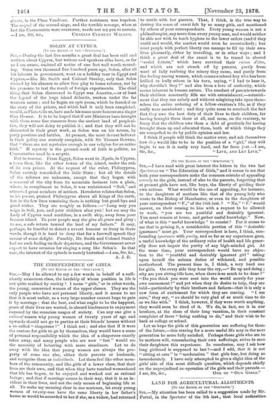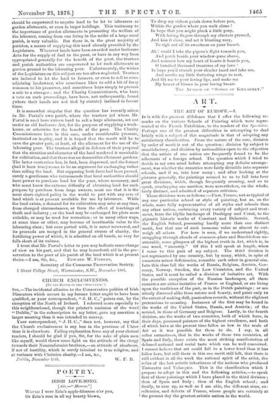LAND FOR AGRICULTURAL ALLOTMENTS.
[TO THE EDITOR OF THE " SPECTATOR.") SIR,—My attention has been called to a suggestion made by Mr; Portal, in the Spectator of the 9th inst., that local authorities
should be empowered to acquire land to be let to labourers as garden allotments, or even in larger holdings. This testimony to the importance of garden allotments in promoting the welfare of the labourer, coming from one living in the midst of a large rural parish, is very valuable. But there is, in the great majority of parishes, a means of supplying this need already provided by the Legislature. Wherever lands have been awarded under Inclosure Acts for the supply of fuel to the poor, or have in any way been appropriated generally for the benefit of the poor, the trustees and parish authorities are empowered to let such allotments as garden ground to the labouring poor. Unfortunately, the wishes of the Legislature on this subject are too often neglected. Trustees are induced to let the land to farmers, or even to sell to some adjoining landowner, who sometimes likes to add a bit of furzy common to his preserves, and sometimes buys simply to prevent a sale to a stranger ; and the Charity Commissioners, who have a veto on such proceedings, have been, not unfrequently, found (where their hands are not tied by statute) inclined to favour them.
It is somewhat singular that the question has recently arisen in Mr. Portal's own parish, where the trustees (of whom Mr. Portal is one) have striven hard to sell a large allotment, set out under an old lnclosure Act, for the purpose of supplying a work- house, or otherwise for the benefit of the poor. The Charity Commissioners have in this case, under considerable pressure, instituted an inquiry, and it is hoped that the result will be to save the greater part, at least, of the allotment for the use of the labouring poor. The trustees alleged in defence of their proposal that the situation and character of the land rendered it unsuitable for cultivation, and that there was no demand for allotment gardens. The latter contention has, in fact, been disproved, and the former (had it been true) seems to be an argument for exchanging rather than selling the laud. But supposing both facts had been proved, surely a gentleman who recommends that local authorities should have power to purchase laud for the poor, where necessary, and who must know the extreme difficulty of obtaining land for such purpose by purchase from large owners, must see that it is the most short-sighted policy in the world to part with any acre of land which is at present available for use by labourers. While the land exists, a demand for its cultivation may arise at any time, from changed circumstances, or from the effect of teachings of thrift and industry ; or the land may be exchanged for plots more suitable, or may be used for recreation ; or in many other ways, at some time or other, may become of inestimable value to the labouring class ; but once parted with, it is never recovered, and its proceeds are merged in the general stream of charity, the fertilising power of which, it is admitted on all hands, so very far falls short of its volume.
I trust that Mr. Portal's letter to you may indicate some change of view on his part, and that he may henceforth aid in the pre- servation to the poor of his parish of the land which is at present Secretary of the Commons Preservation Society.
1 Great College Street, Westminster, S.W., November 18th.



































 Previous page
Previous page